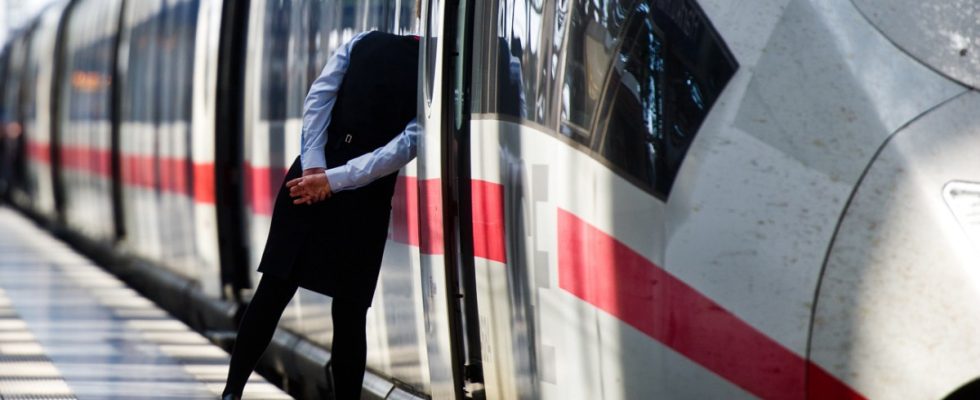If the already highly indebted Deutsche Bahn (DB) incurs additional debts in the billions, then Martin Burkert should actually be one of the first to know. But not because Burkert is head of the EVG railway union. But because the railway unionist also belongs to the supervisory board of the state-owned company DB and is deputy head of the control committee.
But Burkert was quite surprised this week when the federal government suddenly announced that Deutsche Bahn would incur new debts totaling three billion euros for the renovation of the rail network. The deputy head of the supervisory board had known nothing about this. Burkert also finds it “not unproblematic if we go further into debt”. You will have to “ask” the supervisory board how that should work.
EVG boss Martin Burkert sits on the supervisory board of Deutsche Bahn and was surprised by the additional debt of the state-owned company.
(Photo: dts news agency/IMAGO)
The debt burden of the state-owned company is already more than 30 billion euros, which the Federal Court of Auditors has vehemently criticized. The debt of the railway company is “immense and restricts the scope for action,” the Court of Auditors complained in an audit report from March 2023. The railway is developing into a “bottomless pit”.
The railway is supposed to compensate for what the coalition failed to do
The fact that the state-owned company, despite its poor cash position, is now supposed to incur additional billions in debt can be easily explained politically. According to Deutsche Bahn, it will need an additional 45 billion euros over the next few years to renovate the rail network, which has been neglected for decades and is in part ailing. The Berlin traffic light coalition also promised Deutsche Bahn these 45 billion euros in the spring. For the time being, however, only 24 billion euros are certain.
That means the big rest has to be scraped together somehow. If necessary, also with new debts from the railways. This is what the federal government has now announced. In addition to the 24 billion euros, Deutsche Bahn “makes its own contribution of three billion euros – which it finances through a loan on the capital market”. Loans are nothing more than new debts.
The railway is supposed to compensate for what the coalition failed to do. Originally, around 27 billion euros were supposed to flow into the rail network from the state budget and the climate fund, now it’s only 24 billion euros. The Deutsche Bahn itself should contribute the rest. And even then there are still 18 billion euros open to get to the 45 billion. From the point of view of Deputy Chairman of the Supervisory Board Burkert, the renovation of the rail network is extremely difficult. “We can’t just plan in the dark and say the money will come from somewhere.”
The Court of Auditors warns in vain of increasing debt
Mofair, the association of private railways, is also concerned. Mofair managing director Matthias Stoffregen speaks of “opaque” financing. The government’s statement that Deutsche Bahn would incur new debts of three billion euros was “irritating”. How could the state company “be burdened with such a debt”? Asks Stoffregen. By the end of the year, Deutsche Bahn could have accumulated debts of around 40 billion euros. The representative of the private railways wants to know whether “every debt ceiling of the DB Group has now been overridden”. They also need a functioning rail network so that their trains can run on time.
A quick debt reduction at the railways is not in sight. The federal government and the railways are preparing the sale of the international logistics subsidiary Schenker. Schenker is profitable, which could bring billions into Deutsche Bahn’s coffers. According to reports, however, the government is banking on Deutsche Bahn not using the proceeds from Schenker to reduce debt, but investing in this and that project. That could help the government somehow get together the 45 billion euros for the renovation of the rail network.
Meanwhile, the Federal Court of Auditors (BRH) warns in vain that Deutsche Bahn’s debt is “continuing to increase at a worrying rate”. In the March audit report, the BRH calculated that Deutsche Bahn’s debt burden had increased by almost ten billion euros since 2016. That was an average of around five million more debts per day. The Federal Ministry of Transport left it open how it wanted to “get a grip on it concretely and in the long term”.

